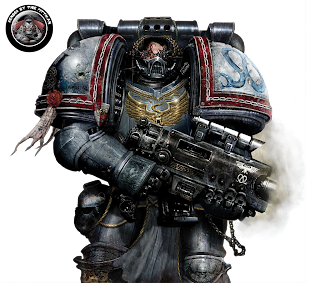Today is about analyzing the Fluff.
When looking at Fluff with the intent of classifying it, we can use any number of criteria. Seeing as I wrote my Master on English literature, I know far too many possible angles. But I've decided to keep it relatively simple (and leave both Derridá and Said to those who actually care).
I will also leave the good or bad judgment for others (though I might do a best of/worst of post at a later date) as this is such a subjective thing. So let's at it.
There are a few aspects of the Fluff that affect us as hobbyists more than others. As I see it, the most important are: the mass, the gaps and the distance. Let's take them one by one, sub-heading style.
 |
| But let's not overcomplicate things... |
The Mass
Why is 40k so interesting? Well, at least partly because of the sheer volume of background material. You can read and read and read and still not have read everything; there is always something new to explore. The same is true - albeit not to the same extent - of Fantasy. GW has been at it for a long time, and the 40k universe has stayed largely the same over time, expanding rather than changing. Where changes have occured, the old background material is still instantly recognizable. While not everything from the first Ork codices is 'true' in any general way anymore, it is still very much possible to build an army based on that Fluff, and have it fit into the modern 40k universe.
Those non-historical games that make up the fringes of the Hobby (Malifaux being the larger part of my personal experience) have a much smaller amount of Fluff, leaving much to the individual storytelling of their hobbyists, for good and bad.
Which leads neatly into:
The Gaps
The Gaps are the blank spots in a game's Fluff; the bits you have to fill in for yourself. For those smaller games, with little Fluff published, these gaps are huge. For historical wargames (I'm looking at you, Flames of War) the gaps are near non-existent. Okay, so DBA players can fill in the gaps left by holes in the documentation, but the final outcome of any campaign is known, and any historical battle fought is a re-fight, a what-if scenario. The same is largely true for parts of the Lord of the Rings franchise, and any other game based on a finite narrative.
 |
| This is what empty space looks at once you've filled in some of the gaps. NASA. |
Which is another part of what makes the 40k Fluff so impressive: it offers a large amount of preset Fluff on which to lean (or fall back on, if you prefer not to make things up for yourself) while still leaving players with enormous lease to choose their own path.
The Distance
In the end, we're talking about games here, which means that any collection of Fluff needs to be evaluated based on its relation to the game it purports to document. And this is the part of this post that could have been split into the most parts.
First there is the actual distance between rules and Fluff. Looking at DBA (De Bellis Antiquitatis, a historical wargame spanning ancient times up to the middle ages), for example, the rule book contains the rules, period. Any background (beyond the names, periods and composition of the forces) needs to be looked up in the history books. The actual distance between Fluff and rules is enormous.
On the other hand, we have the colour text inserted into GW rules, or indeed the very evocative names that Wyrd uses for many of its models' rules (a hillbilly Gremlin whose rule making it terrifying is called Deliverance, for example, reaches the point where the rule becomes Fluff in its own right). Here, the actual distance between Fluff and rules is negligible.
Second, and perhaps more important, is the distance between how things are portrayed in the Fluff, and how the rules make them work 'for real'. Staying with the 40k universe, take the humble Space Marine.
This guy is a genetically enhanced, eight-foot once-human capable of astonishing feats of strength and endurance. He is clad in hermetically sealed, inch-thick armour powered by a small nuclear plant, and wields - at his most basic - a small RPG launcher.
In game terms, he is outmatched by a few Guardsmen, and rather easily wupped by a Guard officer.
The distance between the story and 'reality' is a considerable one, I think you'd agree. Others have, at least, and at one point, rules for 'Movie Marines' were published in - I believe - the American White Dwarf, in which you got a handful of Marines in a 1500 point army. Fun? Maybe probably. Balanced? Hardly.
There are a lot of other examples; spots where the Fluff would translate into impractical game realities, and pragmatism wins out, either diminishing the mighty, or raising the lowly, to avoid a few powerful beings having to be met with hundreds of grunts.
Conclusions
So, Fluff can be placed on a three-axis scale, measuring it's extensiveness (yeah, that might not be a word...), it's completeness (or lack thereof) and its distance to its corresponding rules.
This has been a very technical post. Live with it.
Ta.


More people need to care about Said. I can take or leave Derrida though (sorry Jacques).
ReplyDeletePretty good matrix, to be honest. Personally I like gaps in fluff. Too much detail always puts me off, sort of suggests there's nothing for me to add to this world. I also like some events to remain shrouded in myth. The Horus Heresy was a lot more interesting before it was so exhaustively defined and narrated. Any definitive version of events, even if we invoke fanficcer's rights and ignore it, defines the space it occupies...